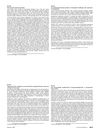TLDR Most women with excess hair growth had Polycystic Ovary Syndrome, and severity wasn't linked to hormone levels.
In a study from April 2013 to October 2014 involving 60 female patients with hirsutism, 70% of cases were due to Polycystic Ovary Syndrome (PCOS), and 26.7% were classified as idiopathic hirsutism (IH). Other causes were less common. The majority of patients had mild hirsutism, and there was no correlation found between hirsutism severity and androgen levels. The study recommended that all women with hirsutism should receive a thorough workup to determine the cause, and that the term IH should be used cautiously. It also suggested that hirsutism scoring should be tailored to specific populations. The study was limited by its small sample size and the absence of free testosterone level measurements.
 20 citations
,
January 2012 in “International Journal of Trichology”
20 citations
,
January 2012 in “International Journal of Trichology” Most cases of excessive hair growth in women are caused by polycystic ovarian syndrome and are linked to higher free testosterone levels.
 13 citations
,
January 2012 in “International Journal of Trichology”
13 citations
,
January 2012 in “International Journal of Trichology” Most hirsutism patients had idiopathic hirsutism or PCOS, with hormonal imbalances and signs like acne and irregular periods.
 1540 citations
,
October 2008 in “Fertility and Sterility”
1540 citations
,
October 2008 in “Fertility and Sterility” The report concludes that PCOS is mainly a condition of excess male hormones and its definition may change as new information is discovered.
 4809 citations
,
January 2004 in “Fertility and Sterility”
4809 citations
,
January 2004 in “Fertility and Sterility” The 2003 consensus updated PCOS diagnosis criteria and highlighted increased risks of diabetes and heart disease for those affected.
 66 citations
,
August 1999 in “The Journal of Clinical Endocrinology & Metabolism”
66 citations
,
August 1999 in “The Journal of Clinical Endocrinology & Metabolism” Women with acromegaly often have irregular periods due to hormone imbalances and growth hormone effects.
 7 citations
,
January 2011 in “Journal of The American Academy of Dermatology”
7 citations
,
January 2011 in “Journal of The American Academy of Dermatology” Most women with hyperandrogenism first show acne, and skin conditions like hirsutism and acanthosis nigricans are good indicators of the condition.

The medicine Diane is effective in treating hair loss, severe acne, and excessive hair growth.
 101 citations
,
January 1985 in “British Journal of Dermatology”
101 citations
,
January 1985 in “British Journal of Dermatology” Spironolactone is effective for treating acne, hirsutism, and androgenic alopecia in women with few side effects.








